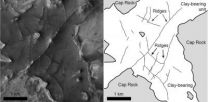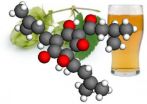(Press-News.org) The latest episode in the American Chemical Society's (ACS') award-winning Global Challenges/Chemistry Solutions podcast series reports a simple way to improve the sensitivity of the test often used to detect traces of explosives on the hands, carry-ons and other possessions of passengers at airport security screening stations.
Based on a report by Yehuda Zeiri, Ph.D., and colleagues in ACS' The Journal of Physical Chemistry C, the new podcast is available without charge at iTunes and from www.acs.org/globalchallenges.
In the new episode, Zeiri explains that most tests for traces of explosives begin by rubbing a swab made from glass fiber, Teflon or cotton over the suspect material. Analysis of the swab in a detector alerts agents to any explosive residues on the swab material.
Common explosives like TNT are solids at room temperature, so the best way to detect them is to search for particulate traces that rub off onto clothing and luggage. To help security agencies prevent attacks more successfully, the researchers studied how explosive particles adhere to surfaces and how they could improve the swabs so they would pick up even smaller amounts of explosives.
The scientists used a so-called atomic force microscope to measure how much the explosive particles stuck to different self-assembled monolayers. They concluded that swab fabrics could be improved to collect smaller amounts of explosives by peppering them with hydroxyl, phenyl and amine functional groups. They believe that such additions could enhance the binding between the swab and irregularly shaped explosive particles.
Global Challenges/Chemistry Solutions is a series of podcasts describing some of the 21st century's most daunting problems, and how cutting-edge research in chemistry matters in the quest for solutions. Global Challenges is the centerpiece in an alliance on sustainability between ACS and the Royal Society of Chemistry. Global Challenges is a sweeping panorama of global challenges that includes dilemmas such as providing a hungry and thirsty world with ample supplies of safe food and clean water, developing alternatives to petroleum to fuel society, preserving the environment and ensuring a sustainable future for our children and improving human health.
###For more entertaining, informative science videos and podcasts from the ACS Office of Public Affairs, view Prized Science, Spellbound, Science Elements and Global Challenges/Chemistry Solutions.
The American Chemical Society is a nonprofit organization chartered by the U.S. Congress. With more than 163,000 members, ACS is the world's largest scientific society and a global leader in providing access to chemistry-related research through its multiple databases, peer-reviewed journals and scientific conferences. Its main offices are in Washington, D.C., and Columbus, Ohio.
To automatically receive news releases from the American Chemical Society, contact newsroom@acs.org.
Follow us: Twitter Facebook
New American Chemical Society podcast: Boosting the sensitivity of airport security screening
2013-01-29
ELSE PRESS RELEASES FROM THIS DATE:
NSF-funded team samples Antarctic lake beneath the ice sheet
2013-01-29
In a first-of-its-kind feat of science and engineering, a National Science Foundation (NSF)-funded research team has successfully drilled through 800 meters (2,600 feet) of Antarctic ice to reach a subglacial lake and retrieve water and sediment samples that have been isolated from direct contact with the atmosphere for many thousands of years.
Scientists and drillers with the interdisciplinary Whillans Ice Stream Subglacial Access Research Drilling project (WISSARD) announced Jan. 28 local time (U.S. stations in Antarctica keep New Zealand time) that they had used a ...
Fossilized conduits suggest water flowed beneath Martian Surface
2013-01-29
PROVIDENCE, R.I. [Brown University] — Networks of narrow ridges found in impact craters on Mars appear to be the fossilized remnants of underground cracks through which water once flowed, according to a new analysis by researchers from Brown University.
The study, in press in the journal Geophysical Research Letters, bolsters the idea that the subsurface environment on Mars once had an active hydrology and could be a good place to search for evidence of past life. The research was conducted by Lee Saper, a recent Brown graduate, with Jack Mustard, professor of geological ...
Researchers find gene that turns up effect of chemotherapy
2013-01-29
Chemotherapy is one of the most common treatments for cancer patients. However, many patients suffer from serious side-effects and a large proportion does not respond to the treatment. Researchers from the Biotech Research and Innovation Centre (BRIC) and Center for Healthy Aging, University of Copenhagen, now show that the gene FBH1 helps turn up the effect of chemotherapy.
"Our results show that the gene FBH1 is crucial in order for some chemotherapeutics to become active in the body and kill the cancer cells. If we can find a feasible method to increase the activity ...
Hydrogen sulfide: The next anti-aging agent?
2013-01-29
Hydrogen sulfide (H2S) may play a wide-ranging role in staving off aging, according to a paper published online ahead of print in the journal Molecular and Cellular Biology. In this review article, a team from China explores the compound's plethora of potential anti-aging pathways.
"H2S has been gaining increasing attention as an important endogenous signaling molecule because of its significant effects on the cardiovascular and nervous systems," the team writes. The evidence is mounting, they note, that hydrogen sulfide slows aging by inhibiting free-radical reactions, ...
New OHSU research helps explain early-onset puberty in females
2013-01-29
BEAVERTON, Ore. - New research from Oregon Health & Science University has provided significant insight into the reasons why early-onset puberty occurs in females. The research, which was conducted at OHSU's Oregon National Primate Research Center, is published in the current early online edition of the journal Nature Neuroscience.
The paper explains how OHSU scientists are investigating the role of epigenetics in the control of puberty. Epigenetics refers to changes in gene activity linked to external factors that do not involve changes to the genetic code itself. The ...
Tomorrow's life-saving medications may currently be living at the bottom of the sea
2013-01-29
PORTLAND, Ore. – OHSU researchers, in partnership with scientists from several other institutions, have published two new research papers that signal how the next class of powerful medications may currently reside at the bottom of the ocean. In both cases, the researchers were focused on ocean-based mollusks – a category of animal that includes snails, clams and squid and their bacterial companions.
Sea life studies aid researchers in several ways, including the development of new medications and biofuels. Because many of these ocean animal species have existed in ...
Beer's bitter compounds could help brew new medicines
2013-01-29
Researchers employing a century-old observational technique have determined the precise configuration of humulones, substances derived from hops that give beer its distinctive flavor.
That might not sound like a big deal to the average brewmaster, but the findings overturn results reported in scientific literature in the last 40 years and could lead to new pharmaceuticals to treat diabetes, some types of cancer and other maladies.
"Now that we have the right results, what happens to the bitter hops in the beer-brewing process makes a lot more sense," said Werner ...
Annals of Internal Medicine early release article for Jan. 29, 2013
2013-01-29
Philadelphia, January 29, 2012 – The Center for Disease Control and Prevention's Advisory Committee on Immunization Practices (ACIP) announced its recommended 2013 adult immunization schedule that includes important updates to the pneumococcal, Tdap (tetanus, diphtheria, and acellular pertussis), and influenza vaccines. Because current vaccination rates are low, ACIP also urges health care providers to regularly assess patient vaccination histories and implement intervention strategies to increase adherence. This recommendation will be published in Annals of Internal Medicine, ...
Study finds significant microorganism populations in middle and upper troposphere
2013-01-29
In what is believed to be the first study of its kind, researchers used genomic techniques to document the presence of significant numbers of living microorganisms – principally bacteria – in the middle and upper troposphere, that section of the atmosphere approximately four to six miles above the Earth's surface.
Whether the microorganisms routinely inhabit this portion of the atmosphere – perhaps living on carbon compounds also found there – or whether they were simply lofted there from the Earth's surface isn't yet known. The finding is of interest to atmospheric scientists, ...
New research uncovers the neural mechanism underlying drug cravings
2013-01-29
Addiction may result from abnormal brain circuitry in the frontal cortex, the part of the brain that controls decision-making. Researchers from the RIKEN Center for Molecular Imaging Science in Japan collaborating with colleagues from the Montreal Neurological Institute of McGill University in Canada report today that the lateral and orbital regions of the frontal cortex interact during the response to a drug-related cue and that aberrant interaction between the two frontal regions may underlie addiction. Their results are published today in the journal Proceedings of ...



